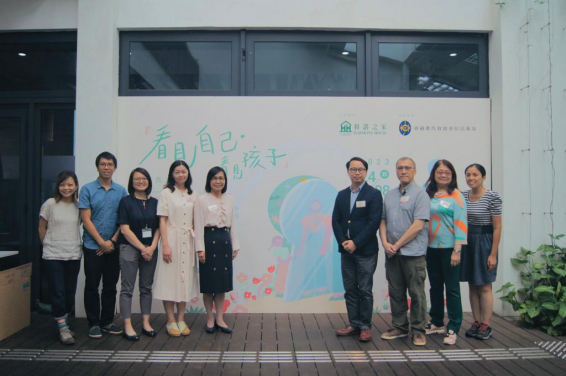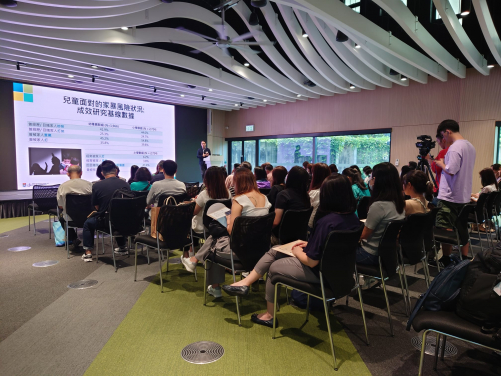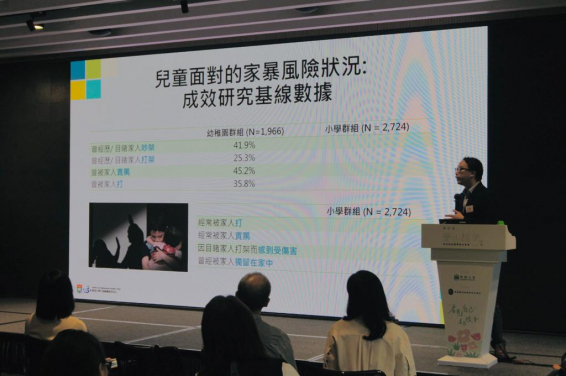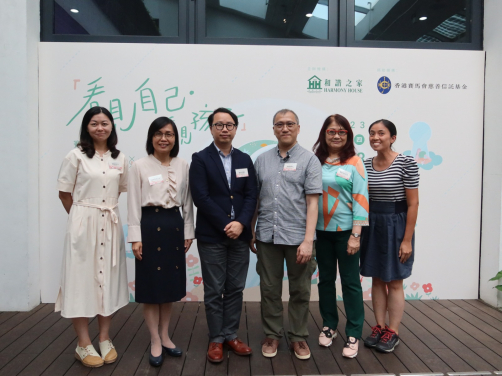Media
“The Hong Kong Jockey Club Smart Kids” Presentation of Research Findings
25 Aug 2023
- 1 / 5
- 2 / 5
- 3 / 5
- 4 / 5
- 5 / 5
Domestic violence not only causes adverse psychosocial impacts on individuals and the family, but also has tremendous psychological and developmental impacts on its victims or witnesses, particularly children. Mounting evidence suggests that public education initiatives aimed at raising awareness of domestic violence among children, parents, and professionals; as well as enhancement programs on parents’ stress management and cultivating compassionate parenting styles, are potential ways to reduce the risk factors of domestic violence. While other countries have achieved varying levels of success by adopting community-based, psychosocial support for family care in addressing domestic violence, this approach is still in its early stages of development in Hong Kong. As existing domestic violence prevention services in Hong Kong primarily rely on a didactic, rote-learning approach, there is an imminent need for Hong Kong to explore creative options for service delivery and principles in the prevention of domestic violence.
In order to fill the existing service gaps in Hong Kong, with the generous support of The Hong Kong Jockey Club Charities Trust, the Harmony House initiated the “The Jockey Club Project Smart Kids” – a multi-component, community-based domestic violence project between 2020 and 2023 to support the furtherance of positive and compassionate parenting and to raise public awareness towards domestic violence through the integration of parenting skills training, expressive arts activities, and the practice of self-compassion through seminars, workshops, professional training, and intervention groups.
This project aims to infuse elements of positive parenting, expressive arts, and self-compassion into family support services for the prevention of domestic violence in Hong Kong. Partnering with the Centre on Behavioral Health, The University of Hong Kong, the project team also offers evaluative studies to explore the efficacy of the program components through surveys and quasi-experimental study designs embedded into the program. Post-activity surveys showed that the program components were positively received by the children, parents, and professionals (N = 2,743).
First, about 95% of the kindergarten children who attended the educational workshops expressed that they had gained a better understanding of their emotions, and about 90% of them reported improvements in their emotional management skills after the workshop. Similar results were also reported among the primary school cohort, in which 80% of the participants reported improvement in their knowledge and know-how in mood management.
Second, parent seminars were well-received (N = 762). Many of the parents shared that the psychoeducational seminars were informative (96.7%) and practical (94.9%), whereas about 98% perceived that they would adopt parenting strategies that are more compassionate in parent-child relationships after the seminars, which might enhance their efficacy in managing parent-child conflicts at home. Parent-child workshops were arranged to establish a platform for non-violent communication between the parent-child dyads (N = 278). About 96% of the families attending the parent-child workshop shared that they enjoyed the relaxing, playful, and sense of safety the workshop has offered through creative activities; parents regarded the playful atmosphere as having opened new avenues for positive communication and mutual understanding between the parents and the children. Around 85% of the parents also shared that the workshop sessions have helped broaden their social network, and 94% reported improvements in subjective well-being after the parent-child, interactive workshops.
Furthermore, professional training workshops were offered to support frontline professionals (N = 562) to enhance their knowledge, practice skills, and willingness to approach and work with children who have experienced or witnessed domestic violence.
Other than workshops and seminars, the program also offered intervention programs for children and parents to further enhance personal competence in emotion regulation and parent-child communication. The research team has successfully surveyed 55 children taking part in the children’s intervention program using a single-group, pretest-posttest methodology. Findings revealed that the intervention programs were helpful in enhancing children’s awareness of positive and negative emotions, and in improving their willingness to share their feelings with others. It was also found that the intervention program has broadened their knowledge of different forms of domestic violence and encouraged help-seeking behaviors.
To support parents in cultivating self-compassion and skills in positive parenting, a professional-led, 6-week intervention program was designed for the parents. Using a quasi-experimental study design with an experimental group (N = 78) and a control group (N = 48), the team explored the effectiveness of the intervention program. When compared with the controls, parents who participated in the self-compassion group intervention showed an increment in positive affect, and a reduction in negative affect, as well as a tendency to use corporal punishment and neglect as ways of disciplining children, and alleviating burnout. The program also demonstrated the potential benefits of cultivating self-compassion, minimizing the use of disciplining strategies and psychological coldness in parent-child contexts.
Baseline data from the study revealed that 35%-45% of the children in the kindergarten cohort have witnessed arguments and physical fights among family members, and about 40% of primary school participants have experienced being left behind at home by their parents. About 43% of the children participants shared that they would feel upset after witnessing physical fights or arguments among the family members, whereas almost 60% of them showed reluctance to share the issues at home with teachers or social workers.
The research at the Centre on Behavioral Health believes that the result of this project showed tentative findings to support the infusion of creativity, playfulness, and compassion into family support programs to prevent domestic violence, and improve personal and family wellbeing. Feedback from the children, parents, and professionals also reflected that the integrative intervention modality is a feasible and acceptable way to deliver support services to help families cope with the challenges they face at home.
The research team recommended that more resources can be devoted to the furtherance of community-based family support programs emphasizing care, response, and understanding to maintain family’s resilience, support the wellbeing of children, raise public awareness of domestic violence, and encourage help-seeking behaviours as preventive strategies against the risk of domestic violence.
For media enquiries, please contact Ms. Lee Ka Yan, Joanne, Project Supervisor, Harmony House tel: 3153 5712/ Email joannelee@harmonyhousehk.com, or Ms. Susanna Lam, Senior Community Education Officer, Harmony House, tel: 2342 0074, email: susannalam@harmonyhousehk.org.
For more details, please contact Ms. Amy Choi, Centre on Behavioral Health, HKU, tel: 2831 5163, email: amychoi@hku.hk, or Dr. Adrian Wan, Centre on Behavioral Health, HKU, tel: 2831 5578, email: awan@hku.hk,or Ms. Melaine Wan, Communications and Public Affairs Office, HKU, tel: 2859 2600, email: melwkwam@hku.hk.





